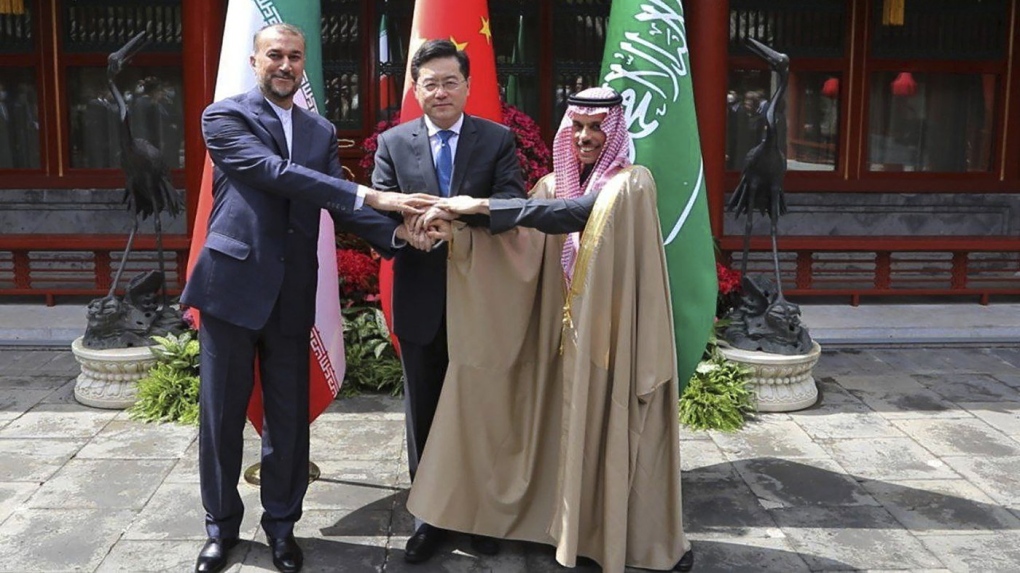Alwaght- Iran’s Foreign Minister said the Islamic Republic’s active presence in the Shanghai Cooperation Organization (SCO) and the BRICS group of countries proves that the policy of isolating Iran has fallen through.
Hossein Amir-Abdollahian told Press TV following meetings with his counterparts from Brazil, India, Russia, Saudi Arabia, the United Arab Emirates, South Africa, the Comoros, and Gabon on the sidelines of his two-day visit to Cape Town, South Africa, to attend a foreign ministerial meeting of the BRICS group of emerging economies
“Iran’s active presence in the Shanghai Cooperation Organization, in the Eurasian Economic Union, and recently in BRICS, shows the global policy of isolating Iran has failed,” Amir-Abdollahian said.
“Countries and alliances act based on their own interests. Our clear and outright message is that the Islamic Republic of Iran cannot be isolated and sidelined.”
The top Iranian diplomat underscored Tehran’s geopolitical and geostrategic status and said the Islamic Republic is implacably against unilateralism.
“We strongly oppose unilateralism, and at the same time make the most out of the existing opportunities within the framework of multilateralism,” Amir-Abdollahian said. “Moreover, Iran enjoys a principal status in the region geopolitically, geo-economically and geo-strategically,” he said.
“Iran lies on the major transit route linking the north and the south, as well as the east and the west. We enjoy a whole range of advantages and facilities, and the other parties benefit from this interaction, too.”
‘BRICS focusing on enhancing multilateralism’
In his interview, Amir-Abdollahian said BRICS was an organization that focuses on the enhancement of multilateralism. He said the five countries which are the key member states of BRICS make up over three billion of the world’s population and cover virtually a fourth of the earth’s surface.
“That shows how influential the BRICS countries are when it comes to focusing on multilateralism, and that is why the Islamic Republic of Iran attaches special significance to BRICS.”
Amir-Abdollahian said the administration of President Ebrahim Raeisi has since taking office been trying to tap into the potential of the regional, economic, political and security alliances, which can further secure Iran’s national interest within the framework of multilateralism.
“We began following up on Iran’s membership in BRICS last year. The five key member states of BRICS, namely Russia, China, Brazil, India and South Africa, accepted Iran’s basic proposal that new members join BRICS,” he said.
“We are scheduled to receive the regulations and protocol put forward by the BRICS members and, accordingly, adopt the necessary measures within that framework. But based on the talks I held with foreign ministers of the key member states, they have seriously prioritized Iran as a potential new member.”
Amir-Abdollahian lauded Iran’s potential membership in BRICS and said, “We will be able to utilize the potentialities of BRICS in order to promote multilateralism to increase trade with member states and enhance economic cooperation to benefit the Iranian nation.”
Talks on promotion of Iran-Saudi ties
The top Iranian diplomat said he had met with his Saudi counterpart, Prince Faisal bin Farhan Al Saud, on the sidelines of the BRICS summit in Cape Town. Amir-Abdollahian said the issue of relations between Tehran and Riyadh and the return of relations to a normal state was of interest to the region.
“The Saudi foreign minister Mr. Faisal bin Farhan and I reached an agreement that the embassies and consulates of the two countries be reopened in Riyadh, Tehran, Jeddah and Mashhad next week,” Amir-Abdollahian said. “Our representative’s office at the OIC – the Organization of Islamic Cooperation – will also be reopened in Jeddah.”
The Iranian foreign minister pointed to the Hajj season and said, “Our pilgrims have been travelling to Saudi Arabia since May 24. It’s important for us that our diplomatic and consular agencies are established and carry out their activities to facilitate the affairs related to the Iranian Hajj and Pilgrimage Organization.”
‘New variety of cooperation emerging in region’
Elsewhere in his interview with Press TV, Amir-Abdollahian said one of the topics he discussed with the Saudi foreign minister was that new opportunities have arisen for cooperation in the region.
“We believe the region is changing,” the top Iranian diplomat said. “In my opinion, the development of economic, commercial, cultural and tourism cooperation at the regional level can guarantee regional security.”
Highlighting the role of the Persian Gulf Cooperation Council, Amir-Abdollahian said, “The existing security models to achieve collective cooperation in the region appear to be outdated.”
‘New world order is taking shape’
Amir-Abdollahian underlined the emergence of a new world order which defies the US hegemony and moves from unilateralism to multilateralism.
“The truth is that a new world order is taking shape. It involves moving away from the unipolar system and unilateralism and the focus of the main global actors is now on the issue of multilateralism and multipolarity,” the Iranian foreign minister said.
Stressing that the United States will barely stand the fact that main actors in the world are moving away from unilateralism and focusing on multilateralism, Amir-Abdollahian said, “They want the current order which is based on US hegemony to be at the center of world attention, but as the concepts in international politics and international relations have changed in recent years, the realities of the international stage have also altered.”
The top diplomat said among the new actors that influence the new world order are such alliances as the Shanghai Cooperation Organization and BRICS.
“In addition to strengthening our bilateral relations with various countries, we will take advantage of existing regional and international mechanisms in order to maximize our national interests.”



























